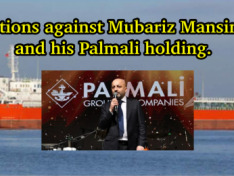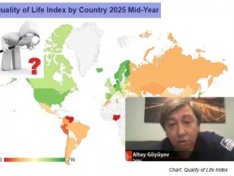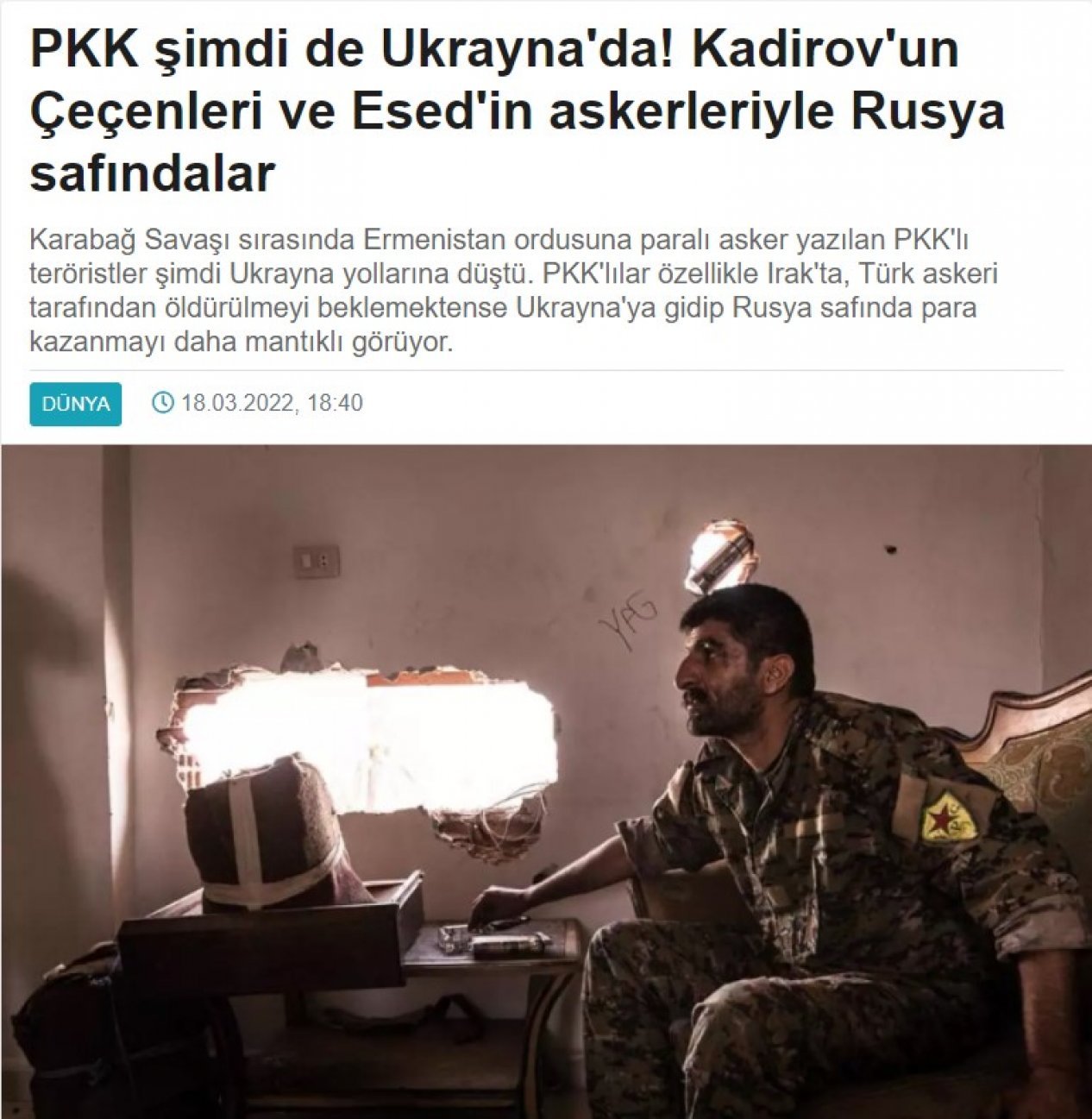
According to the news in the media, PKK terrorists help the Russian army in the Ukraine war, after joining the Syrian and Chechen militants. Regional sources say that PKK/YPG members from Iraq and Syria applied to become mercenaries in the Russian army. The mentioned development took place after PKK leader Duran Kalkan, in a statement to the organization's media, accused the Ukrainian administration of being a 'gang' and justified Russia in the war.
PKK terrorists participated in the attacks on the side of Armenia in the second Karabakh War, which resulted in the liberation of Azerbaijan's occupied lands. During the war in November 2020, PKK members, who supported the Armenian army with more than 1000 militant groups, were paid $600 per person per month in return.
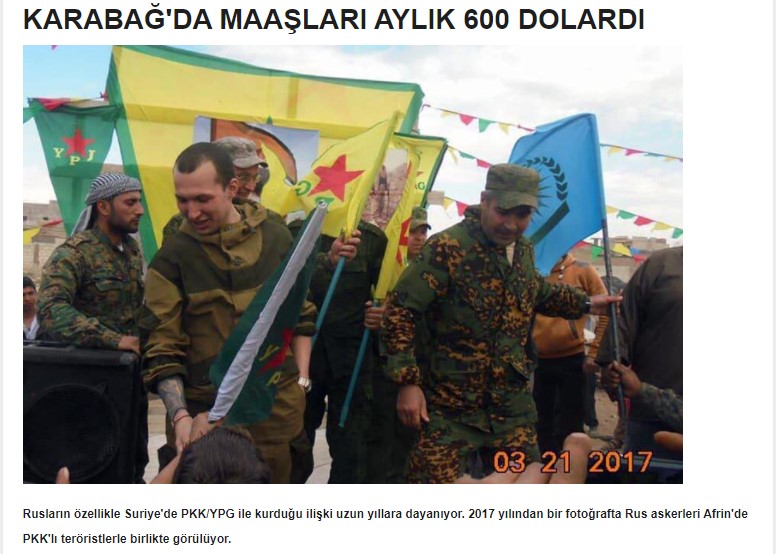
The relationship of the Russians with the PKK/YPG, especially in Syria, goes back to many years. In a photo from 2017, Russian soldiers are seen with PKK terrorists in Afrin. (Source)
Albert Mikaelyan, one of the Armenian soldiers captured by the Azerbaijani army, said: “There are 1,500 people in the barracks, including PKK member mercenaries. The mercenaries receive a monthly salary of $600 and only speak in their own language.” Layika Gultekin, who was the ringleader of the PKK/KCK's women's organization at that time, also told the organization's media outlet: “We go to Karabakh and fight alongside Armenian soldiers. We stand by the people of Armenia whenever they want.”

The fact that the terrorists' last choice as mercenaries is the Ukraine front shows that the PKK, which has become unable to breathe due to the effective operations of the Turkish Armed Forces, is in search of a new solution to survive. It is thought that the PKK members, who have become unable to shelter safely even in the inner parts of Iraq, find it more logical to go to Ukraine and fight in the ranks of Russia and earn money instead of waiting to be killed by the Turkish soldiers.
In the past years, terrorists who are members of the PKK/YPG terrorist organization using the SDG sign in Syria, changed their veils and posed with Russian soldiers in the Manbij countryside.
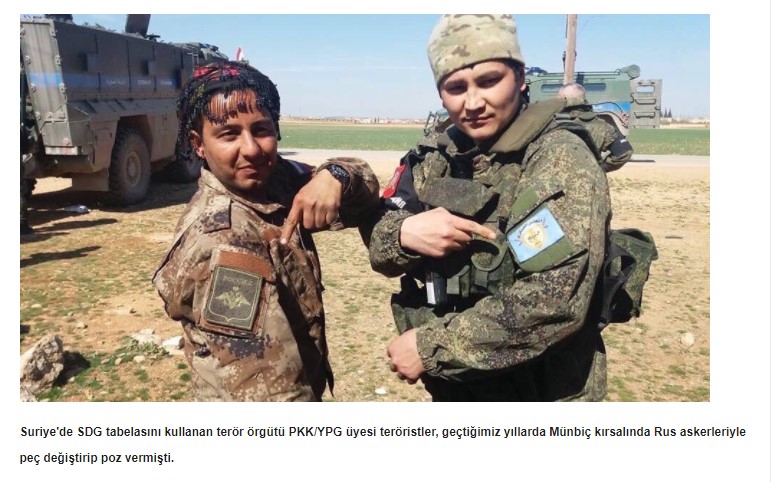
Russia, which suffered great losses at the front, had transformed more than 20,000 soldiers from the Syrian regime into a mercenary militia and transferred them to Ukraine. In addition, hundreds of militias from Chechnya, led by Ramazan Kadyrov, came to the Ukrainian front and joined the Russian army. In other words, both pro-Russian Chechens and Assad's soldiers will appear together with PKK terrorists in the invasion of Ukraine from now on. It is known that Russia promised $1,100 a month to those coming from Syria. (Source) It is thought that the amount to be paid to PKK members is close to this amount.
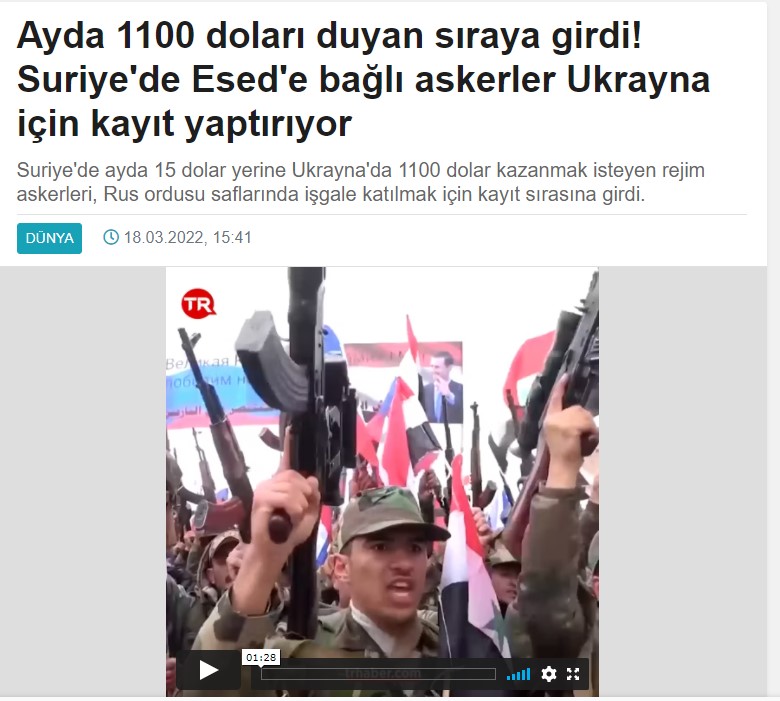
On the other hand, Yeni Safak newspaper wrote that the terrorist organization PKK, which has received both money and weapons support from the US for years, is on the side of Russia in Ukraine, according to sources in Iraqi intelligence. Duran Kalkan, one of the ringleaders of the organization, stated in the statements he made last week that Ukraine cannot win the war. Kalkan said that Ukraine "paid for what it did." (Source)
Armed conflict expert Vera Mironova used the following statements in her post on her social media account: "According to sources in Iraqi intelligence, PKK is already on the ground in Ukraine on Russian side. And before, in 2020 they were in Karabakh war on Armenia side. Their only thing is insurgency (they are very good at it) so we could predict their role there."
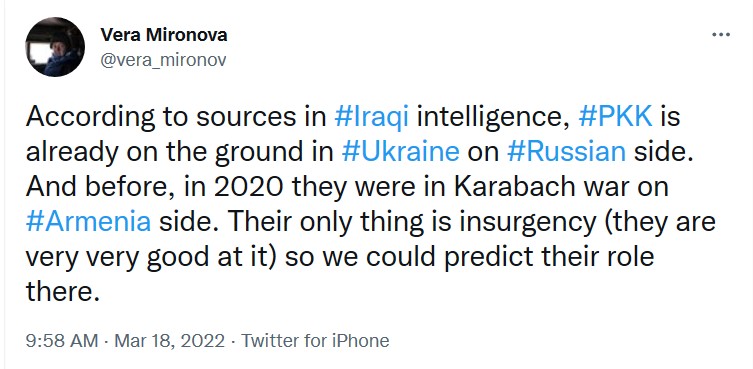
According to the news of TGRT Haber, the terrorist organization PKK-PYD sent its militants from the occupied Syria's Manbij, Tel Temir, Tel Rifat, Ayn Isa, Tabka and Qamishli regions to fight against Ukraine. Ilyushin Il-76 type military transport aircraft, which departed from Kamishli Airport, took 60 PKK/PYD members to Belarus using the Iraq, Iran, Armenia corridor. (Source)
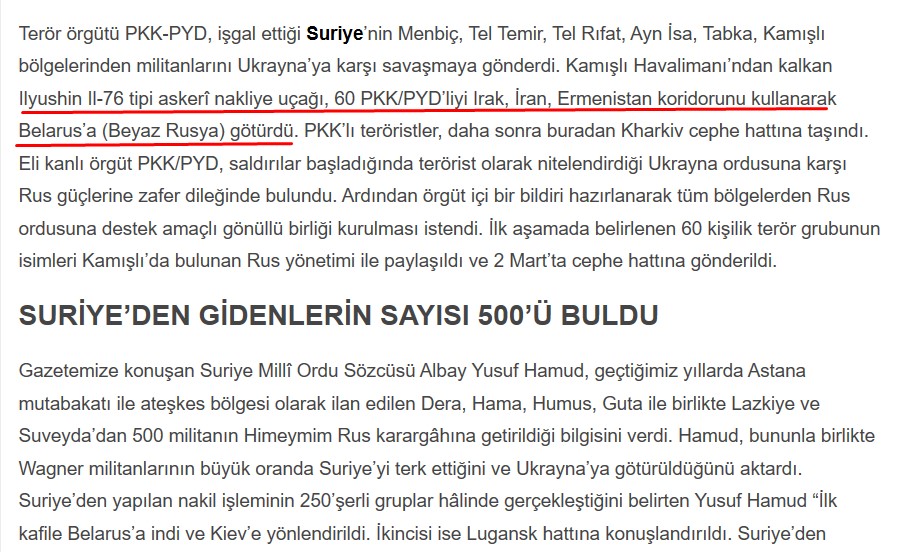
PKK terrorists later moved to the Kharkiv front line from there. The bloody organization PKK/PYD wished victory to the Russian forces against the Ukrainian army, which it described as a terrorist when the attacks began. Afterwards, an intra-organizational statement was prepared and a volunteer union was requested from all regions to support the Russian army. The names of the 60-person terror group identified in the first stage were shared with the Russian administration in Qamishli and sent to the front line on March 2.
Speaking to the Turkish newspaper, Syrian National Army Spokesman Colonel Yusuf Hamudsa informed that 500 militants from Dera, Hama, Homs, Ghouta, which were declared as a ceasefire zone with the Astana agreement in the past years, as well as from Latakia and Suveyda, were brought to the Himeymim Russian headquarters. However, Hamud said that most of the Wagner militants left Syria and were taken to Ukraine. Stating that the transfer from Syria was carried out in groups of 250, Yusuf Hamud said, “The first convoy landed in Belarus and was directed to Kyiv. The second was deployed to the Luhansk line. A significant part of those who moved from Syria were mercenary militants who also fought in Libya. Regime forces and Russian officials continue to collect paid militants in different regions of Syria," he said. (Source)
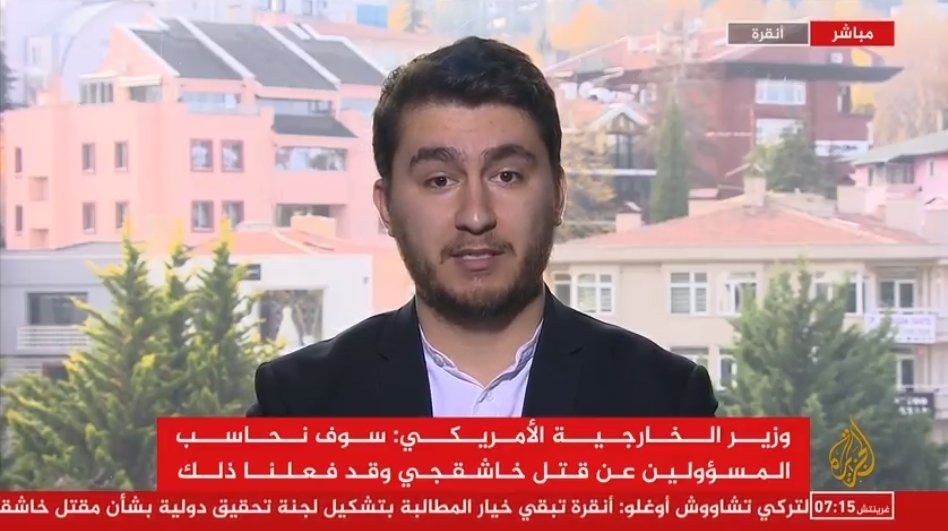
Foreign policy and security expert Omer Ozkizilcik said in a private statement to Faktyoxla Lab. that the rumor that the PKK sent militants to fight in Ukraine on behalf of Russia was first reported to the press by Iraqi security sources. Ozkizilcik stated that after this news, information began to appear in different media that the PKK sent militants to Ukraine, and that Duran Kalkan, who is the so-called leader of the PKK, defined the Ukrainian government as a puppet and a gang, and pointed out that this has increased the suspicions in this regard: Although there is no visual proof that the PKK has sent militants to fight in Ukraine, even such statements are actually sufficient. As a matter of fact, a question arises as to how the PKK, whose Syrian branch the US has supported for years, can get involved in the war on the Russian side in Ukraine. In fact, contrary to the perception of the general public, the PKK is now under the military protection of Russia in Syria. Russian soldiers find themselves on all front lines between the Syrian branch of the PKK and the Syrian National Army. American troops are located in the Iraqi border area and in the south only. While Russia protects the PKK militarily on the ground, the US provides support to the PKK and protects it diplomatically with the threat of sanctions. If Turkey and the Syrian Provisional Government launch a new operation against the Syrian branch of the PKK, the US will be content with imposing sanctions, while Russia directly puts its troops in and defends the Syrian branch of the PKK.
This is a new situation that emerged after the Operation Peace Spring. Being aware of this situation, the PKK administration argues that unlike the new generation who want to work with the US, the PKK and its Syrian branch should approach Russia more. It is possible that the PKK had agreed to send militants to Ukraine in return for continuing to protect them from Russia. Although there is no visual confirmation, it will not be an unreasonable move when evaluated from the PKK's point of view. The only unreasonable thing here is that the US continues to invest in the PKK and Russia opposes Turkey for the sake of the PKK.
Kutluhan Gorucu, the editor of the Syria Agenda website, said: “When we look at the historical process of the PKK/YPG terrorist organization in Syria, especially when we consider its relations with the Assad regime, we can see that the Assad regime has a historical interaction with this organization and the current regime.”
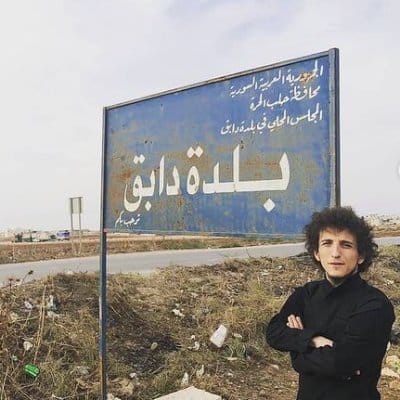
Gorucu also drew attention to the fact that the Assad regime was the power that opened up areas for the PKK in the regions it was in and handed over those regions to the PKK after 2012. It was already known that Assad's soldiers were taken to Ukraine to fight on the side of Russia. Although PKK elements in Syria are funded by the US today, these elements have been working very closely with Russia since 2015, when Russia intervened in Syria. Whether it is the Tel Rifat region, the Manbij region or the Kobani region, we are talking about a long-lasting union. These two sides have been acting together in this geography for seven years. Of course, this also has a historical background. In this sense, when we look at the event from the perspective of this war, since the war started, PKK PYD elements have been making statements in favor of Russia, not Ukraine. There was a statement by Cemil Bayig on this issue. Currently, there is an Armenian battalion fighting alongside the PKK in Syria. It was stated that that battalion fought in favor of the Armenians in the Second Karabakh War. In addition, it was reported in the media that some PKK elements were fighting on the side of the Armenians. When we evaluate these factors, we can see that both the Armenian lobby, the forces that want to establish close relations with the PKK in Russia, and the forces within the PKK, which have historically very close relations with the anti-US forces such as Russia, Iran and the Assad regime, can use the same troops in the Ukraine war.”
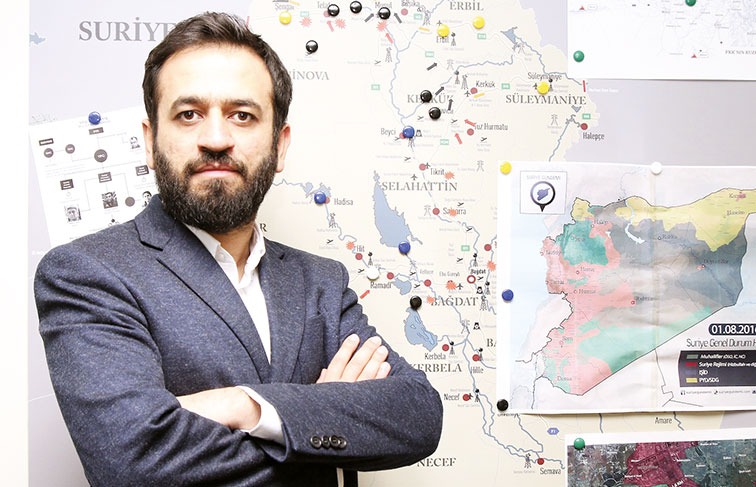
SETA Foreign Policy Researcher Can Acunsa told Faktyoxla Lab. that although there is no concrete information on this subject yet, it will be possible to make an assessment in accordance with the point reached after some information sources have researched the subject in the field. Acun emphasized that after Russia faced serious military difficulties, especially in the Ukraine war, it started to move soldiers and militants experienced in residential area wars to Ukraine in countries such as Syria and Libya, which are in their sphere of influence.
He added that an infrastructure was established for this, especially in Syria, and militants started to move to Ukraine in a process led by the 5th Army officers at the head of the regime: “In this context, there are allegations that some PKK/YPG elements have also moved to Ukraine. Although PKK/YPG elements are generally working with the US, they were engaged with Russia and the Regime in regions such as Tel Rifat and Manbij. Again, in the east of the Euphrates, they sometimes work with Russia. Therefore, in exchange for money, some YPG members may have gone to Ukraine to fight on behalf of Russia.”
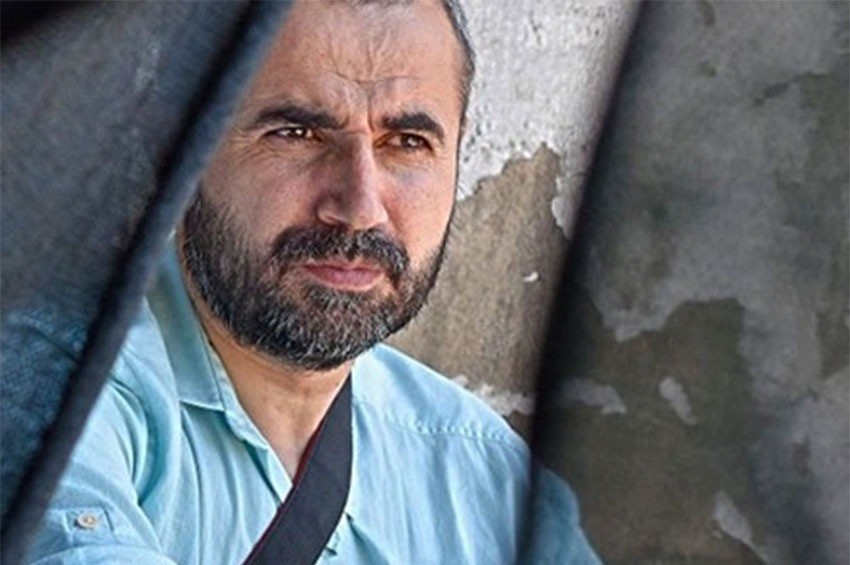
Yilmaz Bilgense, a journalist from the Turkish newspaper, who is in the region, says that PKK members have started to cross into Russia since the beginning of March. According to his words, the first team of 60 people was sent to Russia.
Bilgen pointed out that they participated in the conflicts in other regions, such as the Karabakh war, as a PKK battalion under the direction of Qandil, and that very few of them went from PJAK via Iran, and this time the tactic has changed: "This time, they are all going under the flag of the Assad regime. The discourse on the PKK side is as follows: "In Ukraine, we have been assigned to protect critical points such as Zaporizhzhia and Chernobyl."
They passed from Qamishli to Armenia, and from there they were sent to Ukraine. Their current number has reached 150, but their numbers are not clear as they are all fighting under the Assad regime's banner. Because of the support given by the US to the YPG in the region, they cannot talk about this issue much. They also agreed with Russia on this issue. Kadri Cemil, the General Secretary of the People's Will Party, which is known for its closeness to the terrorist organization YPG/PKK and Russia, is the person who provided this contact. Thanks to their connection, the PKK is fighting on the Russian side in Ukraine.”
As can be seen, PKK terrorists, who previously fought on the side of the Armenians in the Karabakh War, are now fighting on the side of Russia in Ukraine. PKK-YPG terrorists, who for years have covered their hands with the blood of innocent people in the region, and have recently tried to present themselves as a legitimate actor in the international arena, and to turn the internal turmoil in Syria into an opportunity with the political and logistical support of some international powers, don’t want peace and stability in the world. That’s because then there will be no need for them or the forces that support them politically and logistically.


